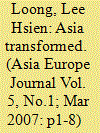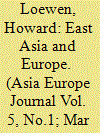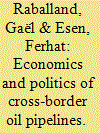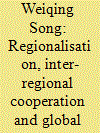|
|
|
Sort Order |
|
|
|
Items / Page
|
|
|
|
|
|
|
| Srl | Item |
| 1 |
ID:
077393


|
|
|
| 2 |
ID:
077395


|
|
|
| 3 |
ID:
077394


|
|
|
| 4 |
ID:
077397


|
|
|
|
|
| Publication |
2007.
|
| Summary/Abstract |
Practitioners and researchers have repeatedly portrayed the Asia-Europe Meeting as an institution that is not fully able to realize its agenda-setting potential in global negotiations or discourses. This paper argues that this assessment basically holds true even after 10 years of cooperation: Although ASEM tries to improve on this meagre balance by establishing a virtual secretariat and advancing common positions on trade, finance and environmental issues, cooperation between Asian and European states is frequently marred by the pitfalls of informality and the antagonisms of different cooperation cultures. Yet, successful moulding of common positions on climate change resulting in the adoption of a respective declaration may indicate an improved multilateral effectiveness of ASEM.
|
|
|
|
|
|
|
|
|
|
|
|
|
|
|
|
| 5 |
ID:
077402


|
|
|
|
|
| Publication |
2007.
|
| Summary/Abstract |
The construction of cross-border pipelines requires large upfront investment and, because of transit through third countries, is subject to increased risk. We demonstrate that the decision to build cross-border pipelines in landlocked regions is influenced more by economics than by politics. Governments use transportation constraints to discriminate among foreign oil companies and to promote low-efficiency routes for political purposes. This paper describes strategies used by importers and oil majors to address this limitation, using the Caspian basin as a reference. Based on data obtained from oil professionals operating in the region, and professional journals, we highlight that, on average, transportation costs in the Caspian basin are up to six times higher than in the other oil-producing regions of the world.
This paper does not reflect opinions and views of EBRD. The authors would wish to thank Yelena Kalyuzhnova, Richard Pomfret, Martin Raiser and Dana Ward. This article was written prior to Mr. Esen having joined the EBRD and contains no data or information which Mr. Esen may have been privy to during the course of his employment with the EBRD.
|
|
|
|
|
|
|
|
|
|
|
|
|
|
|
|
| 6 |
ID:
077396


|
|
|
| 7 |
ID:
077398


|
|
|
|
|
| Publication |
2007.
|
| Summary/Abstract |
On 1 May 2004 the European Union's biggest Enlargement ever materialised when ten countries joined the EU. The new member states-Cyprus, the Czech Republic, Estonia, Hungary, Latvia, Lithuania, Malta, Poland, the Slovak Republic, and Slovenia-brought 75 million new citizens into the Union which now comprises a population of 455 million. In spite of the historical importance of EU enlargement, it seems to have raised relatively little interest beyond Europe. This paper tries to narrow the research gap by discussing the most significant implications of EU enlargement for Europe-Asia relations in the areas of general inter-regional (political) links, trade and investment
|
|
|
|
|
|
|
|
|
|
|
|
|
|
|
|
| 8 |
ID:
077399


|
|
|
|
|
| Publication |
2007.
|
| Summary/Abstract |
A large majority of studies on differentiated integration focus their attention on closer or enhanced cooperation in the EU, neglecting similar developments in other regions, for example, the pathfinder in APEC. In comparing enhanced cooperation in the EU with the pathfinder in APEC, this article aims to discover conditions under which ideas of differentiation can emerge and then be transformed into common policies endorsed by all member states in regional integration. It shall also make clear the reasons why the pathfinder has been applied in APEC while enhanced cooperation has never been used in the EU. It will begin with a detailed categorization of sub-integrations. Then, the author comparatively analyzes the developments of enhanced cooperation in the EU and the pathfinder in APEC, and as a conclusion, evaluates the contribution of this analysis to better understanding of differentiation
|
|
|
|
|
|
|
|
|
|
|
|
|
|
|
|
| 9 |
ID:
077401


|
|
|
|
|
| Publication |
2007.
|
| Summary/Abstract |
International provision of higher education services in both European and East Asian countries increasingly have a regional dimension. The European Union has since 1987 promoted the mobility of students, faculty, and content through its Erasmus Programmes. The 'Bologna' process that began in 1998/1999 now brings over 40 European countries together to create a European Higher Education Area by the end of the current decade. Meanwhile, East Asian countries (10 in ASEAN, plus P.R. China, Japan and South Korea) are also in a process of internationalising their higher education sector with an increasing regional component. Led by Japan, the "ASEAN+3 study group on facilitation and promotion of exchange of people and human resource development" advanced a comprehensive report, welcomed by the East Asian leaders meeting in October 2003, that strives for regional promotion of lifelong learning programs; credit transfer systems; scholarships and exchange programs for students, faculty, staff; research and development cooperation; 'centres of excellence' including e-learning; and curricular development as bases for common regional qualification standards among interested institutions. Both regional processes could reinforce each other in various ways, but possibly chiefly through the Asia-Europe Meeting (ASEM) process, unique among various recent inter-regional dialogue and cooperation processes around the world. Moreover, European and East Asian converging higher education processes could help the rest of the world through world inter-regionalism, and through an overhaul of international organisations dealing with higher education.
|
|
|
|
|
|
|
|
|
|
|
|
|
|
|
|
| 10 |
ID:
077400


|
|
|
|
|
| Publication |
2007.
|
| Summary/Abstract |
The contradiction between trans-boundary issues largely driven by globalisation and conventional authority based on sovereign state leads to the problem of global governance. Regionalisation emerges as a process in which nation states within geographic proximity take collective measures to cope with problems of global governance. With the increasing tendencies of regional cooperation, a new issue thus arises as to the interaction among regions. In fact, the more regionalized the world, the more necessary, enabled and willing for regions to construct connections with each other. Inter-regionalism and trans-regionalism therefore become a further step which regional blocks take to build one layer in the hierarchy of global governance. The paper takes the Asia-Europe Meeting as the case to analyze the above thesis. In the first section, it presents the observation that the global system is characterized with regionalisation, then analyzes the coordination problems facing regions interdependent upon one another and then formulates a modified framework for analysis of the Asia-Europe Meeting. In the second section of rational design, it analyzes the process in which Europe and Asia rationally establish the cooperation structure of ASEM as a means to tackle the coordination issues between the two regions. In the third section of governing globalisation, it discusses the effects and implications of ASEM's contribution towards global governance mainly in ways of rationalizing international relations and strengthening regional identity in the era of globalisation
|
|
|
|
|
|
|
|
|
|
|
|
|
|
|
|
|
|
|
|
|